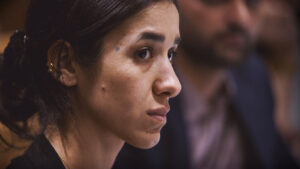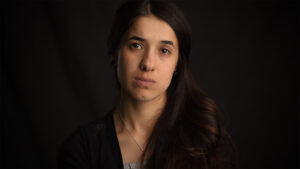Nadia Murad
Credentials
Humanitarian Cause
Human Rights, Violence and Abuse Prevention, Ending Human Trafficking, Women’s Rights, Documenting and Reporting Human Rights Violations, Human Rights Advocacy, Restoration of Justice, Sexual Exploitation and Abuse, Sexual and Gender-Based Violence
Impact Location
Iraq
Occupation
Activist / Founder of Nadia’s Initiative
Photo Gallery
About
Nadia Murad is a Yazidi human rights activist from Iraq, recognized for her tireless advocacy for survivors of genocide and sexual violence. Her work, which has earned her the Nobel Peace Prize and a position as a UNODC Goodwill Ambassador, focuses on bringing attention to the plight of the Yazidi people and other marginalized communities that have suffered atrocities during conflicts.
Born in the village of Kocho in Sinjar, Iraq, Nadia’s life was irrevocably altered in 2014 when ISIS launched a genocidal campaign against the Yazidi community, aiming to eradicate them through systematic killings and the enslavement of women and children. Nadia was one of the thousands of Yazidi women who were captured, sold into sexual slavery, and subjected to unimaginable abuse. Her ability to escape and survive the horrors of captivity became the foundation of her life’s mission: to speak for those who could not. Since her escape, Nadia has dedicated her life to raising awareness about the atrocities committed against the Yazidis and advocating for justice for survivors of sexual violence.
“I’m still processing it, and it’s not something that just goes away when the war ends. It affects you deeply, both physically and psychologically.”
She has worked closely with global leaders and international organizations to highlight the urgent need to address the root causes of such violence and the continued suffering of her people. As the President and Chairwoman of Nadia’s Initiative, she leads efforts to support the sustainable redevelopment of the Yazidi homeland in Sinjar, which was decimated by ISIS. This initiative also focuses on empowering survivors of sexual violence, helping them reintegrate into society while advocating for their rights on the global stage.
Nadia’s memoir, The Last Girl: My Story of Captivity and My Fight Against the Islamic State, is a powerful account of her experience. The book quickly became a New York Times bestseller, capturing international attention and shedding light on the broader issues of human trafficking and sexual violence in conflict zones. Her personal narrative, combined with her advocacy, has made her one of the most influential voices in the global fight against genocide and gender-based violence. The memoir serves not only as a testament to her survival but also as a rallying cry for the international community to take stronger action in preventing such atrocities from occurring again.
“I want to be the last girl in the world with a story like mine.”
In recognition of her extraordinary courage and leadership, Nadia was appointed the first UNODC Goodwill Ambassador for the Dignity of Survivors of Human Trafficking in 2016. This role marked a significant milestone in her journey as a global advocate, as it allowed her to use her platform to bring greater attention to the plight of trafficking survivors. That same year, she received several prestigious awards, including the Council of Europe Václav Havel Award for Human Rights and the Sakharov Prize for Freedom of Thought. In 2018, Nadia was jointly awarded the Nobel Peace Prize alongside Dr. Denis Mukwege, a Congolese gynecologist renowned for his work with survivors of sexual violence. Together, they founded the Global Survivors Fund, an organization dedicated to providing reparations for survivors of conflict-related sexual violence.
Nadia was a driving force behind UN Security Council Resolution 2379, which established the United Nations Investigative Team to Promote Accountability for Crimes Committed by Da’esh/ISIL (UNITAD), and Resolution 2467, which expanded the UN’s commitments to combating sexual violence in conflict.
Through her advocacy work, Nadia has also contributed to major international efforts aimed at advancing women’s rights. As a member of France’s Gender Advisory Council, she pushed for G7 member states to adopt legislation that protects women’s rights and promotes gender equality. Her influence in these spaces has been critical in ensuring that the experiences of survivors of sexual violence are not only acknowledged but addressed through concrete legal and policy measures. Nadia’s work with international organizations continues to drive conversations around the systemic issues that lead to sexual violence in conflict zones, emphasizing the importance of long-term solutions that focus on prevention, protection, and reparations for survivors.
“The way we treat women in times of peace gives us a very clear answer to how women will be treated during the time of war. We need to combat the gender bias and stereotypes in our families, societies, and schools, and it always goes down to education and equality.”
At the heart of Nadia’s activism is Nadia’s Initiative, a non-profit organization that focuses on rebuilding communities in crisis, with a particular emphasis on the Yazidi homeland of Sinjar. Following the ISIS campaign, the Yazidi community was left with destroyed homes, schools, and healthcare facilities, leaving survivors displaced and vulnerable. Nadia’s Initiative partners with local and international organizations to implement projects that restore education, healthcare, and livelihoods, while also focusing on women’s empowerment and cultural restoration. The initiative’s programs are designed to be community-driven and survivor-centric, ensuring that the needs and voices of those directly impacted by conflict are at the forefront of all efforts.
“Thousands of people were killed for no other reason than being Yezidis. They killed men and older women, and they took young girls and women to captivity. They knew that the only way to destroy the community and to make sure that the community never goes back to what it was is to do it through women and children.”
Nadia Murad’s ability to transform her trauma into a force for change is a testament to the strength of the human spirit and the power of advocacy. Her work continues to inspire individuals and organizations across the globe, reminding the world that the fight against violence, persecution, and injustice must remain a priority. As she forges ahead in her efforts to rebuild Sinjar and support survivors, Nadia Murad remains a beacon of hope for those who have endured the horrors of war, sexual violence, and genocide.


